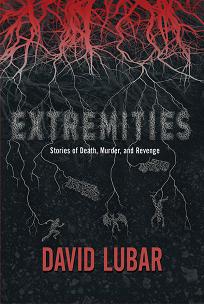Why Extremities Matters to Me
And Why It Should Matter to You
 Through a combination of luck, hard work, and talent (listed in descending order of importance), I have the good fortune of making a fair portion of my living doing something I love very much—writing short stories. Before you feel even a twinge of envy, let me add that I earn an equivalent portion speaking in steamy gymnasiums crammed with seventh graders. I have more than 200 stories out there, including many contained in the six Weenies collections for middle graders. I should be happy. I am happy. But I wanted more. Specifically, I wanted to share my older, darker stories with the world. Some of them were written intentionally. (Years ago, I was asked to contribute a story to a Christopher Pike anthology. At one point, he decided to write all the stories himself.) Others just sort of came out that way, which is fine with me. I'm always delighted when my work horrifies me.
Through a combination of luck, hard work, and talent (listed in descending order of importance), I have the good fortune of making a fair portion of my living doing something I love very much—writing short stories. Before you feel even a twinge of envy, let me add that I earn an equivalent portion speaking in steamy gymnasiums crammed with seventh graders. I have more than 200 stories out there, including many contained in the six Weenies collections for middle graders. I should be happy. I am happy. But I wanted more. Specifically, I wanted to share my older, darker stories with the world. Some of them were written intentionally. (Years ago, I was asked to contribute a story to a Christopher Pike anthology. At one point, he decided to write all the stories himself.) Others just sort of came out that way, which is fine with me. I'm always delighted when my work horrifies me.So, there I was, with a passion for short stories that had been nurtured during a childhood reading science fiction magazines, story collections from the great SF writers, and anthologies from the great SF anthologists. I knew with certainty that the world would devour these stories if they were available. (Writing requires a certain degree of certainty about uncertain things.) Several of them appeared in anthologies, and two were featured on that excellent site, iPulpfiction.
By the early part of this century, I was well known enough that I could comfortably pitch an idea to any editor I encountered. I repeatedly had the following experience.
Me: Can I pitch something to you?
Them: Sure. We'd love to put you on our list.
Me: It's a young adult
Them: (eyes widen hungrily)
Me: horror
Them: (eyes wider, lips licked)
Me: story collection
Them: (POOF—leaving Wiley Coyote staring at a dust cloud.)
This happened over and over. Nobody wanted the collection, because STORIES DON'T SELL. I think this is one of the most brutal self-fulfilling prophesies in publishing. There are exceptions, including my own Weenies collections. But stories are a hard sell. On top of the industry resistance, there's a second problem. Students are fed a lot of literary fiction in school. And much of that fiction is plotless. (You might enjoy my satirical summary of literary story types )
Finally, around 2002, I found an editor who liked nine of the stories. He told me that as soon as I wrote a tenth story that he liked, he'd give me a contract. For two years, I sent him stories, none of which did the trick. Finally, I confronted him with the possibility that he really didn't want to do this book, and was just stringing me along. He admitted that this was the case.
The collection sat dormant for a while. (When one bangs one's head repeatedly against a brick wall, an occasional break is called for.) Then, I had a minor brain storm. I'd envisioned the book as a traditional horror collection. But some of the darker stories on my hard drive weren't supernatural. A title hit me: Extremities: Stories of Death, Murder, and Revenge. I pitched it to an editor I knew. She was eager to see the manuscript. She promised a reply by a certain date. When the deadline passed, I showed it to another editor who happened to contact me about another matter. A week later, I received offers from both editors at the same time.
After a bit of panic, I went with the first house, Marshall Cavendish. The book was scheduled for 2013. In early 2012, Amazon bought Marshall Cavendish. I am not a fan of Amazon. I bought the book back, and begged Tor, who publishes the Weenies collections, to think about publishing it. (They already had a large list of my books in the works, and originally passed on this one.) To my relief, they agreed. Not only did they take over the book, they threw all their expertise into making it look as amazing as possible, including a gorgeous cover and thirteen stunning illustrations. I am, indeed, a lucky guy.
So, this is why I care so much about the book. I fought, battled, cajoled, begged, and maneuvered. It is finally coming to market. Early reviews, especially from teens, have been great. But there is still a lot of resistance to story collections. I need this book to do well to show the publishing industry that there is a place for short stories (and to validate my decision to walk away from the marketing power of Amazon and place my trust with the real-world book sellers). I love stories. I'll keep fighting for them. I will be an evangelist. If you love stories, please think about picking up a copy of the book for yourself, your favorite teen, or your local high school or public library.
